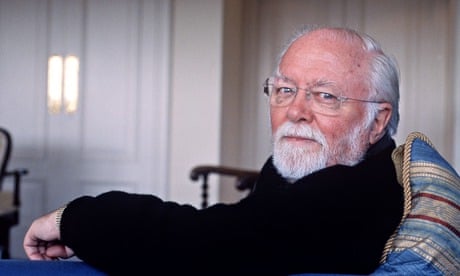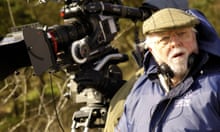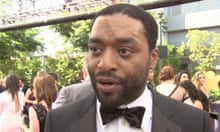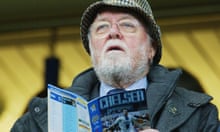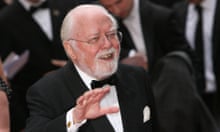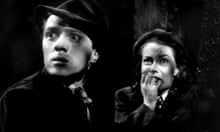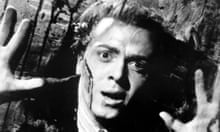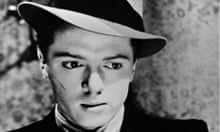How he hated being called "Dickie". It sounded like the name of a luvvie lightweight – and Richard Attenborough, the brilliant stage and screen star, and director of the multi Oscar-winning Gandhi, was anything but that. He was always a beaming, cherubic, endlessly charming, endlessly garrulous man: actor, producer, director, world-class networker and committee man, an establishment heavyweight and incorrigible wearer of the Garrick Club salmon-and-pink tie.
Attenborough started out the quintessential character actor: he was the baby-faced, sinister Pinkie in Brighton Rock in 1947, before that, a scared young naval rating in In Which We Serve in 1942. Later, he would morph into the stiff-upper-lipped Squadron Leader Bartlett in The Great Escape in 1963, and, chillingly, returned to villainy as the thin-lipped Reginald Christie in 10 Rillington Place in 1971. Yet he was finally to evolve into the apparently benign old visionary in Spielberg's Jurassic Park (1993) and the lovable teddy-bearish Santa Claus in Miracle on 34th Street (1994).
But it was a director that he became the conqueror of Hollywood, with two Oscars for Gandhi – the film took eight overall. "Dickie" was how he came to be known to the public; that was his brand, and in fact that was how he was professionally christened. He was registered at Rada as Dickie Attenborough, because they already had a Richard and a Dick. Moreover, he had a habit of addressing people in precisely this way: John Mills was "Johnny"; Bryan Forbes was "Forbesy".
Attenborough was an old-school British film mogul who nailed down huge funding or casting decisions over a good lunch. Sending off box-ticking forms to official funding bodies like the UK Film Council or the BFI wasn't his style; when Attenborough started work on Gandhi in the 1960s, he simply got Mountbatten to introduce him to Nehru and took things from there. A lifelong Labour man, he would nonetheless embarrass Neil Kinnock during the 1987 election by cheerfully showing up for photocalls in his beloved Rolls Royce. But he never let politics get in the way of the film business and lavished his passionate bubbling enthusiasm and charm on Margaret Thatcher. "Why on earth didn't you come and see me before, Sir Richard?" she asked thoughtfully, after he had addressed a Downing Street seminar on the subject. "Because you never asked me, darling!" he replied.
Richard Attenborough used "darling" to pin people down and his phrase "Entirely up to you, darling" was a masterstroke of passive-aggressive coercion. Actors and colleagues would be asked to join his movie or charitable committee but told it was "entirely up to them". No-one could resist him. Tellingly, he had been introduced to this technique by his mother, who in wartime assembled the Attenborough boys (Richard, David and John) and told them she was thinking of taking in two children from the kindertransport as their honorary siblings, if they consented. It was entirely up to them!
As a character actor, in the earliest phase of his career, Attenborough had a doughy everymanish face which made him eminently castable in any and every type of non-lead role, with a competent class range from upper-middle to lower-middle. He always looked very young, though, and was often landed with the "juve" role – most notoriously in the 1948 film The Guinea Pig, in which he played a cockney boy who had been given a scholarship to a public school as part of an experiment in social mixing. Incredibly, Attenborough was then 25 years old, and had to keep the school cap on so that no one could see his growing bald patch.
But even then he was already building relationships with producers and directors, and had a natural flair for spotting properties and developing projects. Some of his work with Bryan Forbes is of great interest: Forbes wrote The Angry Silence in 1960, in which Attenborough plays a young factory worker who comes close to a nervous breakdown because he has been sent to Coventry by his mates for breaking a strike. This is a film which, like John Boulting's famous I'm All Right Jack, is sometimes looked at a little askance for being apparently anti-union, but it is actually bold and disquieting, not entirely dissimilar in spirit to Basil Dearden's Victim. Similarly intriguing is Richard Attenborough's role in the creepy 1964 thriller Seance On A Wet Afternoon (again, scripted by Forbes) as the husband of a phoney spiritualist.
Attenborough got into directing with his hugely admired screen version of Joan Littlewood's first world war satire Oh! What A Lovely War! and his breezy commanding charm showed him to be a natural director and leader of men, interestingly drawn to historical and military subjects: he went on to direct Young Winston and A Bridge Too Far.
But it was that monumental 1982 three-hour biopic of Gandhi that was his finest hour. This was a high-minded, old-fashioned epic with a compelling central performance using thousands upon thousands of real, non-CGI extras – arguably the last real historical epic of this sort. It was a massive picture in the style of David Lean, and its triumph was the cause of a froideur between Attenborough and Lean, who had himself nursed a Gandhi project, but then let it lapse, gave his permission to Attenborough to run with it – and was reportedly far from delighted to see Attenborough make it such a success, especially as his own career was in the doldrums, and his "Indian" project, a version of Forster's A Passage To India, was coolly received.
It was Attenborough's good fortune to have found the Anglo-Indian actor Ben Kingsley and given him the role which he was born to play. Later, when he was casting his Chaplin biopic, Attenborough had the luck to chance upon the mercurial young actor Robert Downey Jr, who could do such an eerie impersonation. Again, Attenborough showed his sureness of touch: cast a brilliant unknown, so that the picture itself was the star.
With extraordinary energy, and his irrepressible and ingenuous good humour, Attenborough continued with public commitments until almost the very end, relinquishing his presidency of Bafta only a few years ago. What a sad day for the British film industry.
